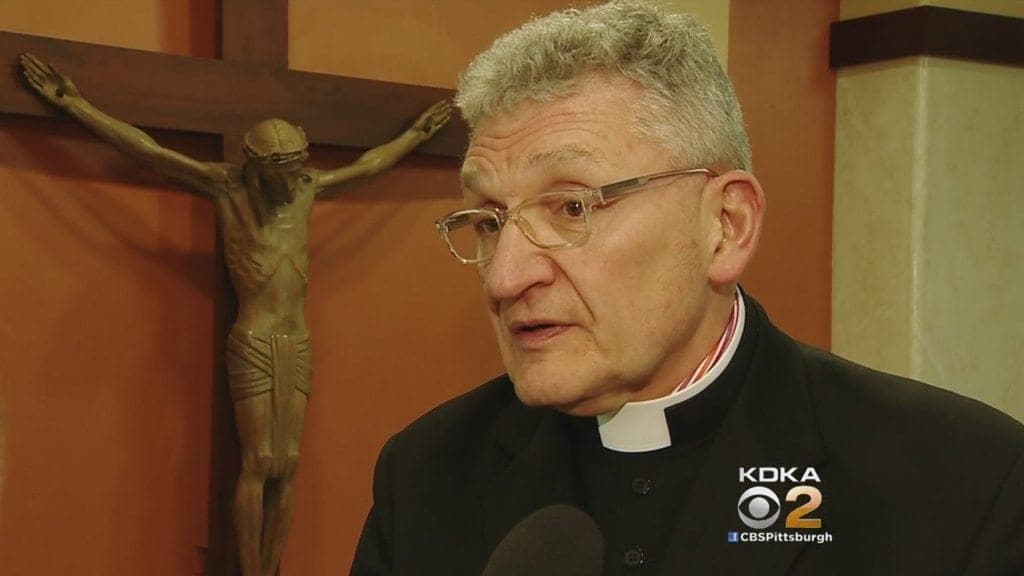On America’s 240th Independence Day, Bishop David Zubik of Pittsburgh called on Catholics to be “footnotes” for the truth that is Christ.
“I would like to suggest, on this Fourth of July celebration, as we mark the end of our Fortnight for Freedom of 2016, that we take a look at how you and I are called to be footnotes,” he said.
“And footnotes to the truth that is none other than Jesus Christ, Himself,” Zubik exhorted the congregation at the July 4 closing Mass for the Fortnight for Freedom.
Using his undergraduate term papers as an example, the bishop explained that footnotes “help to embellish the truth of whatever is being conveyed. Footnotes strengthen the message that is being put forth.”
Similarly, by their living witness, Catholics should point to Christ, he said.
Zubik preached the homily at the closing Mass for the Fortnight for Freedom, held Independence Day at the Basilica of the National Shrine of the Immaculate Conception in Washington, D.C. Cardinal Donald Wuerl of Washington, D.C. was the main celebrant, with six bishops and 28 priests concelebrating. Some 1500 people were in attendance.
Apostolic Nuncio Archbishop Christophe Pierre was also present at the Mass, as was Archbishop William Lori of Baltimore, chair of the U.S. Bishops’ ad-hoc Committee on Religious Liberty.
The Fortnight for Freedom is an annual period of prayer, fasting, and education for the preservation of religious freedom called for by the U.S. Conference of Catholic Bishops. It lasts from June 21, the eve of the feast of martyrs Thomas More and John Fisher, to July 4, Independence Day.
The theme of the 2016 fortnight was “witnesses to freedom,” honoring the example of martyrs throughout the centuries. Relics of Sts. Thomas More and John Fisher made a U.S. tour during the fortnight, available for veneration by the faithful.
Drawing from the Gospel reading of John 14, Jesus’ discourse with the Apostles, Zubik noted that Jesus “speaks about giving them freedom, He speaks about giving them that internal peace which nobody else can give, and which nobody else can take away.”
Christians are called to live this internal freedom, he said, citing St. Paul’s epistle to the Colossians, “the freedom to equally and together stand up for the ultimate truth Who is Jesus Christ Himself.”
To be a “footnote,” he added, is really “to be a witness, to stand up for, to be a living sign of, to be a proponent for.” In the Greek language, a “witness” is called a “martyrion,” he explained, or a “martyr.”
Thus, to be a “footnote” for Christ means to be a “martyr, to have the guts to stand up for, to be a visible sign of the truth that is, in fact, Jesus Christ,” he added. Christians throughout the centuries have done just that, he said, from St. John the Baptist and Sts. Peter and Paul to Sts. Thomas More and John Fisher in the 16th century, to the martyrs of the 20th century like Blessed Miguel Pro and St. Maximilian Kolbe.
There are martyrs even today, he noted, such as the 21 Coptic Christians “who were beheaded in February of last year on a seashore in Libya because they would not back off of the truth that is Jesus Christ.”
The Little Sisters of the Poor, who face crippling fines for refusing to comply with the administration’s contraception mandate, are also “powerful footnotes, witnesses, martyrs to the faith,” he said, because they “will not back off the truth that is, in fact, Jesus Christ.”
What Catholics in the U.S. must remember on the 240th anniversary of the Declaration of Independence is that “belief in the very existence of God” is “one of the foundations of this country,” he said.
It is also clear that at the beginning of the country “religious freedom” was understood not only to mean freedom to worship, he said, but applied to “how we live our faith when we walk outside the doors of our churches, our synagogues, and our mosques.”
Thus Catholics must be witnesses, “footnotes” to the faith in the public square, he insisted, and must not only “pray for the preservation of religious freedom,” but should also “speak up” for it and “live that religious freedom.”
“And so it is within the context of what we do here around the Lord’s table, the table of His word and the table of the Eucharist, that we beg God for the grace, for the strength, for the determination, for the guts to be footnotes, to be witnesses, to be martyrs for the cause of Jesus Christ,” he said.















